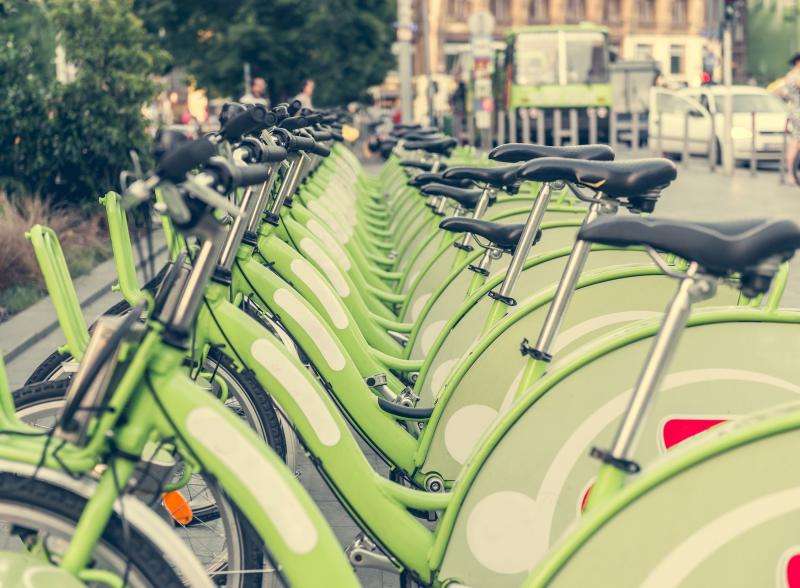Sun Belt cities' bike-share users more likely to bike for recreation

A new report from Rice University's Kinder Institute for Urban Research finds that Sun Belt city residents are most likely to use bike-share programs for recreation, compared with users in the Midwest or Northeast, who regularly use the same programs for their daily commute.
The report, "Shifting Gears: Framing Bike-sharing Trends in Sun Belt Cities," examines how consumers use bike-sharing programs in Austin, Fort Worth, Houston and Denver. The study is the first of several to be released by the Kinder Institute in the coming months and seeks to advance the understanding of the dynamics already at play in Sun Belt bike-share systems.
Bike-share systems are a growing part of the transportation options and recreational landscape of many cities. They place rentable bikes at a network of kiosks with bike docks and pay stations across a city. At most hours of the day, users can check out bikes from any kiosk after buying a daily pass or purchasing a longer-term membership. Riders can return bikes to any kiosk in the network.
"The flexibility of the system allows riders to use bikes for a variety of reasons – to commute to work, go out for a drink, exercise, run errands or take a relaxing ride," said Kyle Shelton, a postdoctoral research fellow at the Kinder Institute and the study's co-author. "Riders can engage in these pursuits without needing to own and maintain a personal bike, wait for transit or drive a car."
The researchers grouped bike trips into four categories: weekday two-location (starting and ending at different kiosk locations), weekend two-location, weekday round-trip and weekend round-trip. Differentiating among the four types revealed that the four cities have a diverse set of bike-share programs and varied usage.
The study found that bike-sharing varies considerably across individual kiosks. In all four cities, the overwhelming majority of kiosks generate more two-location trips than round-trips. And in all four systems, round-trip activity is concentrated at a handful of kiosks located in parks or along bike trails.
"Recent discussions of bike sharing have focused on the large systems in Northeastern and Midwestern cities and tend to emphasize bike sharing as convenient means of commuting to work," Shelton said. "While riders in Sun Belt cities make trips for a variety of purposes, including commuting, many riders—especially in the Texas cities – use bike share for recreation. Many of these kiosks near parks or bike trails are among the most heavily used stations in all four cities."
In Houston and Fort Worth, only about one-third of trips are weekday two-location trips. The remaining two-thirds of the trips in these cities are round-trips or occur on weekends.
"This suggests that these programs cater primarily to recreational users," said Kelsey Walker, a postbaccalaureate research fellow at the Kinder Institute and the study's co-author.
However, in Denver and Austin, more than half of users' trips are weekday two-location trips.
"These trips are most likely to replace peak-hour commuting trips made by other transportation modes," Walker said.
Shelton and Walker hope the report will provide a richer understanding of how people use bike-share programs in lower-density and traditionally car-centric cities in the Sun Belt. As cities in the Sun Belt and around the country add, expand and implement bike-sharing systems, subsequent studies will examine kiosk characteristics and network dynamics more thoroughly.
"We hope that these findings will lead cities to view bike share not only as a novel form of public transit, but also as an accessible and exciting piece of park programming," Shelton and Walker said. "Moreover, we hope that a closer look at the bike-sharing activity in these four cities will better equip decision-makers across the country to develop locally appropriate bike-sharing systems that capitalize on their cities' existing strengths."
To conduct the research for this report, the Kinder Institute initially partnered with Houston Bike Share as a part of Rice's involvement with the MetroLab Network, in which local and regional governments collaborate with university researchers to develop strategies for improving metropolitan infrastructure and services. To facilitate a richer understanding of bike-share activity throughout the Sun Belt, the Kinder Institute acquired comparable data from the bike-share organizations in Austin, Denver and Fort Worth, all of which contract with the same vendor, BCycle.
Provided by Rice University

















